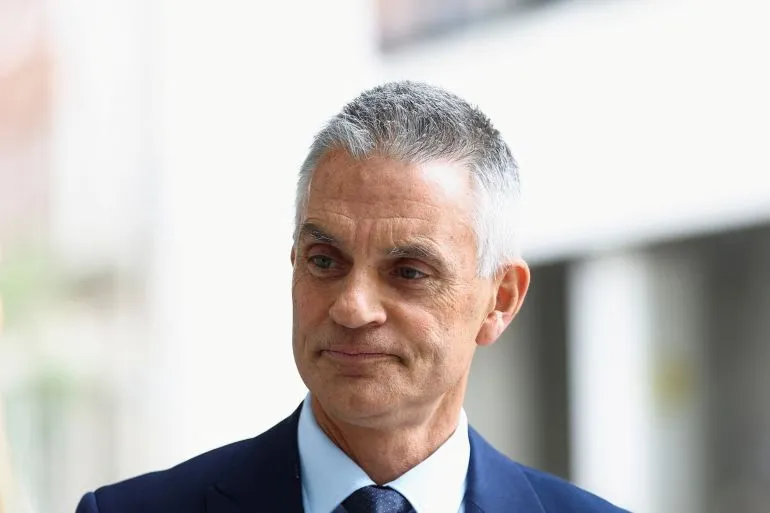BBC Leadership Resigns Amid Controversy Over Trump Speech Edit

In a significant development for the British Broadcasting Corporation (BBC), both Director-General Tim Davie and the Chief Executive Officer of BBC News, Deborah Turness, announced their resignations on Sunday. Their decision comes in the wake of a leaked memo that criticises the editing of a speech made by former US President Donald Trump, which was featured in a BBC Panorama documentary.
The memo, authored by Michael Prescott, a former adviser and journalist, highlighted that segments of Trump’s January 6, 2021, speech were edited together in a manner that suggested he incited the violence that occurred during the Capitol riots. Prescott, who consulted for the BBC’s Editorial Guidelines and Standards Board until June 2025, alleged that the editing misrepresented Trump’s words, leading to a false narrative.
In a social media post responding to the resignations, Trump labelled both Davie and Turness as “very dishonest people” who attempted to manipulate the electoral process. He expressed his views on his Truth Social platform, suggesting that their departures were a consequence of their actions regarding his speech.
Tim Davie, who became the BBC’s Director-General in September 2020, stated that he was taking “ultimate responsibility” for the situation and emphasised the intense pressures associated with his role. He remarked that the decision to resign was made after careful consideration of his responsibilities over several years.
Deborah Turness, who has headed BBC News since 2022, echoed these sentiments in her resignation message, noting that the fallout from the Trump documentary was damaging to the BBC, an institution she holds dear. Turness affirmed the necessity for leaders to be accountable in public life, clarifying that while mistakes were made, allegations of institutional bias within the BBC were unfounded.
The controversy originated from the BBC Panorama programme titled "Trump: A Second Chance?", aired shortly before the 2024 US presidential election. The edited clip presented Trump encouraging his supporters with phrases that were taken out of context. Critics have pointed to discrepancies between the edited version and the original transcript of Trump’s speech.
On the day of the resignations, David Yelland, a former editor of the Sun newspaper, described the situation as a “coup”, although this has been denied by both Davie and Turness. The incident drew further criticism from Karoline Leavitt, former press secretary to Trump, who labelled the BBC as “100 percent fake news”.
In addition to the focus on the Trump documentary, Prescott’s memo raised concerns regarding the BBC’s approach to various issues, including its reporting on transgender topics and its coverage of the ongoing conflict in Gaza. He accused the BBC Arabic service of exhibiting bias against Israel, claiming that the corporation misrepresented the humanitarian situation in Gaza.
Charles Moore, a former editor of the Daily Telegraph, supported these claims, stating that the BBC has a systemic bias in its reporting, particularly regarding Israel. This sentiment was echoed by more than 100 BBC employees who signed a letter expressing concerns about the lack of accountability in the organisation’s coverage of critical issues.
The BBC has faced scrutiny over its editorial decisions in the past, including a high-profile incident involving presenter Gary Lineker, whose comments on immigration led to a brief suspension. Other controversies have centred around historical failures to address serious allegations of misconduct within its ranks.
The resignations of Davie and Turness occur at a crucial time for the BBC, as the UK government is preparing to review the corporation’s Royal Charter, which governs its operations. UK Culture Secretary Lisa Nandy has previously described allegations of bias as serious, indicating that the review is intended to help the BBC adapt to contemporary media challenges.
Jonah Hull, reporting for Al Jazeera, noted the significance of these resignations for the BBC, an institution renowned for its commitment to impartial journalism. The BBC Chair, Samir Shah, has acknowledged an error in judgement relating to the editing of Trump’s speech but maintains that the organisation is not systematically biased.
As the BBC navigates this turbulent period, its leadership and public perception will be closely examined in light of the ongoing discourse surrounding media impartiality and accountability in journalism.

UIDAI Introduces New Aadhaar App for Digital Identity Management

Gautam Gambhir Aims to Propel India Ahead in T20I Format

Reserve Bank of India Permits Silver as Loan Collateral

Tata Motors Announces Listing Date for Commercial Vehicle Division





